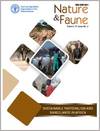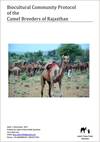Resilience is defined as the ability of people to mitigate, weather, and “bounce back” from shocks or adversity. However, understanding the resilience of people and their livelihoods to the kinds of shocks and stresses associated with violent conflict requires a different set of analyses. This paper reviews over fifteen years of research by the Feinstein International Center, Freidman School of Nutrition Science and Policy at Tufts University in order to examine the nexus of conflict, livelihoods, and resilience.
Year of publication: 2017Organization:
Topic: Cambio climático, Conflicto, Resiliencia
Language: English
Type of document: Técnico
Geographical coverage: Global
Peste des petits ruminants (PPR) is a deadly, fast spreading viral disease that kills 90% of the animals it infects. This affects 300 million families across Africa, Middle East, Turkey and Asia, pushing them into poverty and food insecurity. But PPR is easily diagnosed and can be prevented with a reliable and affordable vaccine that provides lifelong immunity from the disease.
The Food and Agriculture Organization of the United Nations (FAO) and the World Organization for Animal Health (OiE) have been working with communities and governments around the world on a global strategy to end PPR and move a step closer to achieving the Sustainable Development Goals. This video aims to create awareness about the disease as a step towards its control and complete eradication by 2030.
Year of publication: 2017Organization: Organización de las Naciones Unidas para la Alimentación y la Agricultura (FAO), Organización Mundial de Sanidad Animal (OIE)
Topic: Economía, Seguridad alimentaria, Resiliencia, Servicios sociales
Language: English
Type of document: Videos
Geographical coverage: Global
This edition of Nature & Faune journal explores the intricacies of sustainable pastoralism and rangeland management in Africa. It contains articles on the realities of livestock production in Africa, including: extensive rangeland conditions; rangeland ecosystems and sustainability; wildlife benefits and conflicts in pastoral systems; land tenure systems in pastoral settings, forest feed for livestock; animal disease control; agro-silvo-pastoralism; and impact of livestock on water and soil degradation.
Year of publication: 2017Organization: Organización de las Naciones Unidas para la Alimentación y la Agricultura (FAO)
Topic: Cambio climático, Conflicto, Género y juventud, El conocimiento indígena, Pueblos indígenas, Innovación, Tierra, Participación
Language: English
Type of document: Técnico
Geographical coverage: Norte de África, África Occidental, África Central, África Oriental, África Meridional
The Biocultural Community Protocol (BCP) describes the camel breeders of Rajasthan, India, and their traditional lifestyle that promotes the conservation and sustainable use of biological diversity. It describes the challenges that the camel breeders face from the disappearance of grazing areas, spread of disease and lack of market development. It concludes with suggested interventions that will support conservation and sustainable use of the camels.
Year of publication: 2017Organization:
Topic: Economía, Servicios ambientales, El conocimiento indígena, Pueblos indígenas
Language: English
Type of document: Técnico
Geographical coverage: Asia Meridional
Tsetse-transmitted trypanosomosis, is widely considered as a major constraint on livestock production and rural development in sub-Saharan Africa. This study conducted in the IGAD region maps the maximum economic gain if losses due to trypanosomosis in cattle were to be removed. At a regional level, the map shows where the benefits of controlling the disease would be highest. Different approaches to dealing with either tsetse or trypanosomosis would enable some or all of these benefits to be realized, over smaller or larger areas.
Year of publication: 2017Organization: Organización de las Naciones Unidas para la Alimentación y la Agricultura (FAO)
Topic: Economía, Sanidad
Language: English
Type of document: Técnico
Geographical coverage: África Oriental
Pastoralist communities in Karamoja and Turkana negotiate with their neighbors to access water and pasture to keep their livestock alive. The communities are using their negotiation, networking and relationship building skills to access resources critical for their survival.
Year of publication: 2017Organization:
Topic: Seguridad alimentaria, Pueblos indígenas, Resiliencia
Language: English
Type of document: Videos
Geographical coverage: África Oriental
Boletín que contiene actualizaciones de actividades, eventos y experiencias de organizaciones pastorales de la sociedad civil.
Year of publication: 2017Organization: Organización de las Naciones Unidas para la Alimentación y la Agricultura (FAO)
Topic: Seguridad alimentaria, El conocimiento indígena, Pueblos indígenas, Organización, Participación
Language: Español
Type of document: Boletines
Geographical coverage: Global
Did you know that securing the future of pastoralism is central to attaining food security for the over 25% of the population that lives in dry lands? Pastoralism has been proven to increase the adaptive capacity for these communities enabling them to build resilience to attain food security.
Year of publication: 2017Organization: Autores individuales
Topic: Seguridad alimentaria
Language: English
Type of document: Videos
Geographical coverage: África Oriental









